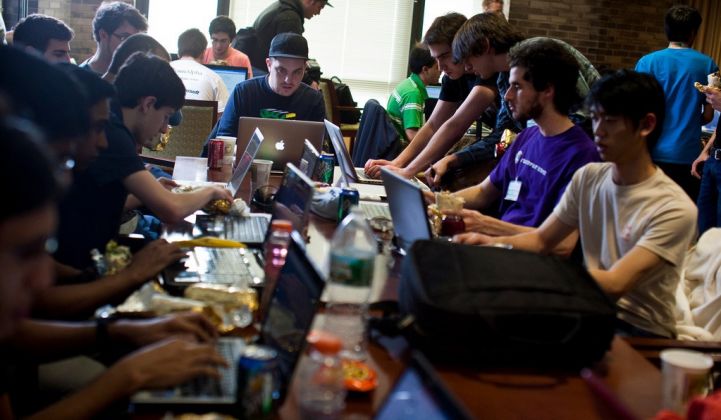Tendril is making its first foray into Europe, and it’s inviting the world’s app developers to join in. The Boulder, Colo.-based home energy management software startup announced Wednesday that it would work with Dutch retail utility Essent to create an “apps store” of mobile and web browser-based software for the utility’s customers to use, all built by independent developers.
The two will start with a small set of apps for a test group of Essent’s customers who have smart meters, said Tim Breeden, senior director of Tendril’s application developer program.
Eventually, the apps could be opened up to the rest of Essent’s 2 million households, he said. Essent is also a subsidiary of massive European power company RWE Group, which supplies 24 million customers and reported 51.7 billion euros in revenue last year, Breeden noted.
Tendril, which has dozens of U.S. utility partners, opened its APIs to developers last year, and has participated in recent “hackathons” in San Francisco and New York, aimed at getting developers to write code for its platform. Ideas range from dashboards to show hour-to-hour power consumption and pricing over days, months or years, to automation mobile apps that allow homeowners to turn off house lights and power strips when they’re out.
Social applications are also hot, with neighborhood competitions, prize and coupon giveaways for energy saving, and other efficiency-themed promotions hoping to create communities of energy-minded users who will take the next steps into more active engagement with their home’s power use. We’ve yet to see that happen, of course, since home energy management remains a pilot-project-bound endeavor.
Tendril also been heavily involved in the “Green Button” program to create a common format for customer energy data that’s downloadable and sharable with other third-party software and service providers. It has been working with utilities including Texas’s Oncor and CenterPoint and California’s San Diego Gas & Electric on integrating third-party apps like Simple Energy onto its smart meter and broadband-connected consumer gateways and web portals -- an early example of what the apps store of home energy might start to look like.
“What we’ve been able to achieve there is, we get consumers to upload Green Button data to the site, and developers can immediately begin to write their applications against consumer data,” he said. “In that sense, we’ve tied developers directly to consumers.”
Still, that extra step of downloading the data and uploading it to a service could be a major barrier for mass adoption of energy apps. Homeowners just don’t care that much about their energy bills, and studies show they’re unwilling to spend much at all -- about $50, tops -- for the ability to manage it through technology.
Essent, in contrast, is giving Tendril’s platform direct access to customer meter data, Breeden said. That’s critical, because Essent’s smart meters deliver data in near to real time, a feature most U.S. smart meters lack, but one which would be ruined if customers had to download and upload their data on their own.
Tendril hasn’t identified any specific apps it’s aiming for, because it isn’t building them, Breeden said. It’s hoping to see a few potential partners emerge from events like The Next Web Kings of Code Hack Battle in Amsterdam, which starts today and plans to announce a 1,000-euro prize winner tomorrow. That’s a lot faster than typical utility technology deployment schedules, to put it mildly.
Essent is also interested in apps to help it win customers, Breeden said. The Netherlands has a deregulated utility industry, and Essent is an energy services provider (ESP), the equivalent of a retail electricity provider (REP) in U.S. deregulated markets like Texas. That means it and dozens of other companies have to spend money on marketing and customer acquisition that vertically integrated utilities just don't have to worry about.
That, in turn, makes ESPs far more interested in trying out different customer engagement strategies, using whatever routes into the home they can find, including mobile and broadband. These efforts may or may not be focused on energy efficiency or engagement -- there’s plenty of the free-toaster style of crass marketing -- but then, we haven’t seen the full power of “crowdsourcing” the development of the home energy tech space yet, Breeden said.
Europe has seen other experiments of this kind. Germany’s Yellostrom has partnered with Cisco on broadband-connected smart meter pilots in Germany, for instance, and Panasonic has tested out its “smart home” technology with Danish retail utility SEAS-NVE. Germany and Scandinavia have the most deregulated energy markets, and they also tend to have more smart meters connected to home broadband, making real-time data exchange and analysis more possible.
More broadly, "smart city" projects in Amsterdam, London, Barcelona, Vienna, Antwerp and elsewhere have drawn the likes of Cisco, IBM, Microsoft, Accenture and Capgemini to the table, though the continent's economic crisis has put strain on massive infrastructure projects like these.
Of course, taking home energy data to the internet, which is what we’re talking about here, also opens up privacy and security concerns. Two cybersecurity experts announced in January that they’d hacked the smart meters of Germany energy provider Discovergy to monitor residents’ home-and-away patterns, and even “spoof” energy usage data.
Breeden said that Tendril’s apps developer platform was secured up to industry standards, in the same way a mobile app developer platform would be. In the end, it’s the individual customers who will choose whether or not to cede control of their energy data for new social media apps, in the same way they might give away their physical location to Foursquare or their drunken party photographs to Facebook. But will saving energy be as fun?



